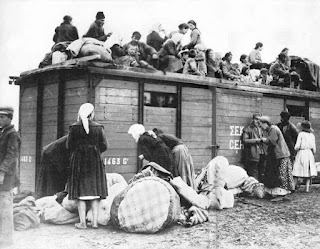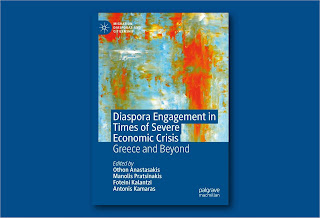On 15 November 2022, the European Studies Centre, in cooperation with SEESOX, hosted an event marking the centenary of the conclusion of the Greek-Turkish War in Asia Minor. Titled Globalizing the Greek-Turkish 1922: displacements, population movements and the coming of the national state, the discussion was chaired by Faisal Devji (St Antony’s College). The speakers were Georgios Giannakopoulos (City University, London), (University of Leeds), and Marilena Anastasopoulou (Pembroke College, Oxford).
Giannakopoulos’ presentation focussed on the population exchanges between Greece and Turkey in the aftermath of the Greek-Turkish War. His guiding question was whether the Greek expansionist project was an effort to protect Greek populations, or an imperialist venture. The motivations behind the post-war settlement were a “unique blend” of imperialist, nationalist, and internationalist imageries, with various figures representing different faces of the endeavour: Nansen as the humanitarian, Curzon as the imperialist, and Venizelos as the nationalist.
At the same time, he situated the developments in Greece and Turkey within a broader international context. The “Global 1922,” he pointed out, included a number of state-forming events, such as Egypt’s declaration of independence, the creation of an Irish Free State, and the official establishment of the USSR. The infamous March on Rome also happened in the same year. According to Western commentators like Toynbee, disquiet in Asia Minor threatened the West with a new kind of “Moral Balkanisation.” However, the presenter argued that this global perspective challenges myths of Western homogeneity.
Giannakopoulos concluded that the Treaty of Lausanne was not a departure from previous treaties but the logical conclusion of the politics of territoriality. Lausanne, he said, proposed 19th century solutions to 20th century problems, but would simultaneously become a template for resolving minority issues in the future. As Frank would detail in his presentation, authoritarian countries such as Germany, Italy, and the USSR drew inspiration from Greece and Turkey, though they did not study Lausanne closely as a legal precedent.
Total Pageviews
Monday, 21 November 2022
Monday, 14 November 2022
Diaspora engagement in times of severe crisis: A European comparative perspective
On Tuesday 8 November 2022, SEESOX, in cooperation with the European Studies Centre, convened a discussion entitled Diaspora engagement in times of severe crisis: A European comparative perspective, with Othon Anastasakis (Director, European Studies Centre) and Manolis Pratsinakis (COMPAS, Oxford) appearing as speakers. Contributing author Irina Laphsyna (Ukrainian Catholic University) delivered a presentation on her chapter, and Maria Koinova (University of Warwick) offered her comments on the volume. The event was convened on the occasion of the publication of the new book Diaspora engagement in times of severe economic crisis: Greece and beyond (2022, Palgrave Macmillan) by Othon Anastasakis, Manolis Pratsinakis, Foteini Kalantzi, and Antonis Kamaras.
The driving question of the new book is: how do severe economic crises impact diaspora-homeland relations? The present volume addresses this question by exploring diaspora engagement in Greece during the protracted post-2009 eurozone crisis. It looks at the crisis as a critical juncture in Greece’s relations with its nationals abroad. The contributors explore aspects of diaspora engagement, including transnational mobilisation, homeland reform, the role of diasporic institutions, crisis driven migration, alongside comparisons with other countries in Europe.
Anastasakis began the discussion with a general overview of the work. He situated the new wave of Greek emigration within the context of the 2009 economic crisis, the sharpest decline the country has seen since the 1930s. With a 25% decline in GDP and unemployment reaching 27%, the country introduced severe austerity measures. What followed was a wave of outward migration and severe brain drain, as public trust in the system plummeted.
He then outlined several sub-questions within the book. Firstly, to what extent, and in which areas, was the crisis a cut-off point and the catalyst for different modes of diasporic engagement? Secondly, what types of engagement do we identify and how do these differ from the pre-crisis ones? Thirdly, did the crisis result in missed opportunities or even disengagement between homeland and particular diaspora actors and cohorts? Finally, was the Greek crisis an exceptional and unique case, or is it generalisable and relevant to other similar or parallel interactions of homeland-diaspora engagement in Europe during the years of the financial crisis?
The driving question of the new book is: how do severe economic crises impact diaspora-homeland relations? The present volume addresses this question by exploring diaspora engagement in Greece during the protracted post-2009 eurozone crisis. It looks at the crisis as a critical juncture in Greece’s relations with its nationals abroad. The contributors explore aspects of diaspora engagement, including transnational mobilisation, homeland reform, the role of diasporic institutions, crisis driven migration, alongside comparisons with other countries in Europe.
Anastasakis began the discussion with a general overview of the work. He situated the new wave of Greek emigration within the context of the 2009 economic crisis, the sharpest decline the country has seen since the 1930s. With a 25% decline in GDP and unemployment reaching 27%, the country introduced severe austerity measures. What followed was a wave of outward migration and severe brain drain, as public trust in the system plummeted.
He then outlined several sub-questions within the book. Firstly, to what extent, and in which areas, was the crisis a cut-off point and the catalyst for different modes of diasporic engagement? Secondly, what types of engagement do we identify and how do these differ from the pre-crisis ones? Thirdly, did the crisis result in missed opportunities or even disengagement between homeland and particular diaspora actors and cohorts? Finally, was the Greek crisis an exceptional and unique case, or is it generalisable and relevant to other similar or parallel interactions of homeland-diaspora engagement in Europe during the years of the financial crisis?
Subscribe to:
Posts (Atom)


